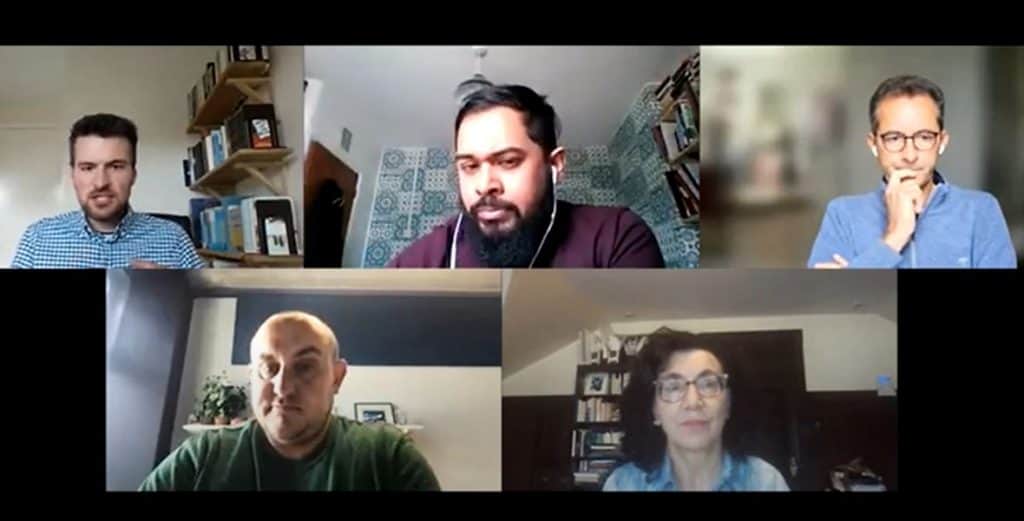British Islam — and how it differs from Islam in Macron’s France
The new generation of British-born Muslims needs leadership so that they feel no conflict of loyalty between nation and faith.
Professor Jocelyne Cesari, of Birmingham University’s Department of Theology and Religion, says a younger generation of Muslims are increasingly more religious than their parents.
“These young people are very British and very attached to their faith. Teaching them is not only the role of the family. There is a gap between some forms of leadership that are replicating the discourse or patterns of some Muslim countries and working within the British culture.”

The call came during What is British Islam — and What is French Islam?, a panel discussion at the Religion Media Festival, Exploring Belief. Professor Cesari described European states’ interference with all religious minorities everywhere since 9/11 as “the secularisation of religion” and accused the French president, Emmanuel Macron, of using the fear and the anxiety that most French had over Islam, for political gain.
“There is a clear rejection of all kinds of visibility of religion in the public space. It happens that Muslims are the most visible — but most of the other religious groups have adjusted to religion having to be most of the time in the private and not public space. But this is impossible for religion and something that the French cannot accept for multiple historical and religious reasons. Where do you draw the line between what is public and what is private?”
She added that all European countries were facing this challenge but the levels of governmental discrimination in France against religion were the highest, and Muslims also suffered social discrimination, even though they felt French.
She said: “This is a group very much under siege. Even if it has lots of pitfalls and issues, discrimination is still there.”
Panel host Tim Wyatt asked why President Macron believed Islam was in crisis and there was a need for a more enlightened reformation in the faith, an “Islam of France”, resulting in the current crackdown on “Islamic separatism”.
Hakim El Karoui, an author and senior fellow of Institut Montaigne, explained that it was about an organisation and theology. President Macron wanted to reassure French society that the French were looking for real solutions to counter terrorism and that they were trying to block the ideology of political Islam. He believed the solution lay with French Muslims needing to organise themselves better and offer solutions for funding, the training of imams and French language ideology from foreign influences such as Morocco, Turkey and Algeria.
Dr Abdul-Azim Ahmed, of Cardiff University, who is assistant secretary-general of the Muslim Council of Wales, said it was important to step back and examine the kind of political arrangements under which we live in Europe and that the idea of a nation state is historically relatively new.
“It has many similarities to traditional religions such as considering itself the only legitimate identity and loyalty you can have. It’s a repository of sacred values and a rejection of any other form of organising community or society,” he said.
“What you have in Britain, France and other places, is a clash between different communities who want to organise on different terms that the nation state is just not happy with.
“When government states speak about a British or French Islam, they are very often trying to argue for an Islam or religious context that accepts the supremacy and authority of the state is absolute and this is almost comparable to some of the more sacredly held values of religious communities.
“France is at the extreme end of the spectrum of regulation and Britain has in the past 10 to 15 years moved in that direction with things like British values enshrined in the curriculum and repeated attempts to regulate religion in ways which I think do start impinging on civil freedoms.
“However, Britain does have an historical tradition within the Christian church which provides more space for religious groups to organise themselves and to maintain those freedoms. France has taken that logic to a much further degree because of some of the historical factors in terms of a much stricter, much less tolerant interpretation of what secularisation might look like.”
Joseph Downing, a fellow in nationalism at the London School of Economics, accused politicians of manufacturing a crisis where there was none. He said, sociologically speaking, there did not seem to be a mutual exclusivity or incompatibility between religious ideas and identity and a national identity.
He said there was an extremely high level of integration of Muslims in France despite the state. President Macron used the issue of Islam to gain political capital when he had run out of other options. However, on the ground, there was not a massive clash of civilisations. He cited research that showed at least 10 times more French Muslims were in the French army than had gone to fight for or were linked to al-Qaeda .
“There will never be one single unified French Islam any more than a single unified French Catholicism or French Judaism. Any government effort to codify and control, whether institutionally or through funding, is doomed to failure because people are diverse,” he concluded.
This article by Anna Averkiou first appeared on the Religion Media Centre Website in May 2021.